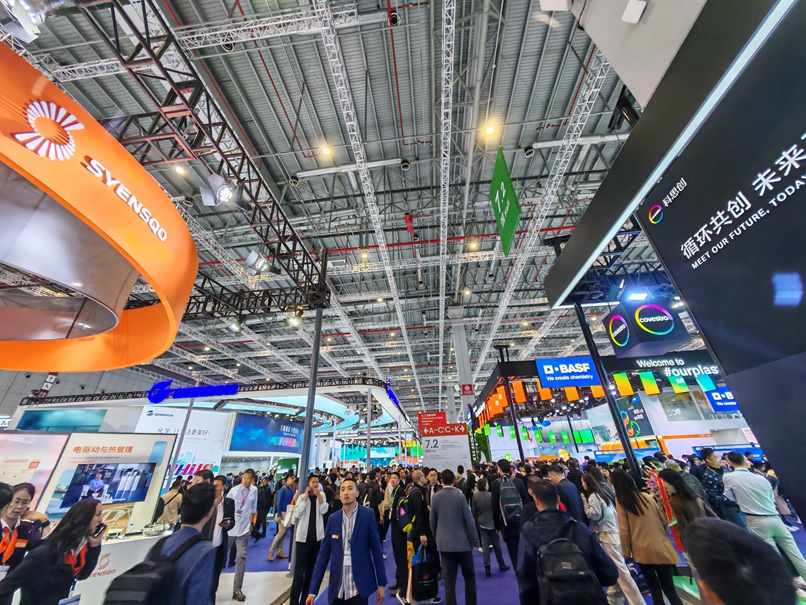 Chemical Firms Bring New Solutions Tailored for New Energy Industry at Chinaplas
Chemical Firms Bring New Solutions Tailored for New Energy Industry at Chinaplas(Yicai) April 30 -- Chemical companies have seized the opportunities brought by the new energy industry, especially the new energy vehicle industry, to develop tailored solutions to showcase at the International Exhibition on Plastics and Rubber Industries, also known as Chinaplas.
Mitsubishi Gas Chemical showcased new solutions in line with automobile electrification, including battery, thermal management, and casing materials, at Chinaplas. Among them were Novaduran and Xantar, two series of engineering plastics specifically designed for vehicle casings and electrical equipment housings. The firm also displayed its lightweight solutions, such as glass-fiber reinforced thermoplastic composite sheets to extend NEVs' driving range.
This year's edition of Chinaplas was held in Shanghai between April 23 and April 26. Some 1,500 chemical companies exhibited their products at the event. The number of visitors soared 30 percent to 322,000 from the previous edition, of which 73,000 were foreigners, up 158 percent. The event will be held in Shenzhen next year.
As a polycarbonate manufacturer, Mitsubishi Gas Chemical Engineering Plastics (Shanghai) has injection molding plants as its main customer, Wu Jian, a staffer at the Chinese subsidiary of Japanese firm Mitsubishi Gas Chemical, said at Chinaplas.
Mitsubishi Gas Chemical Engineering Plastics (Shanghai) has been recently expanding its customer base beyond Japanese carmakers to include a wide range of Chinese companies, Wu noted, adding that there are differences between materials for NEVs and traditional fuel-powered vehicles. For example, NEVs do not have engines, meaning that they have a higher demand for noise reduction.
Japan's Toray Industries showcased its concept car Teewave AC2 at Chinaplas. The vehicle uses components made with the company's high-performance materials. Most of these components have already been equipped on electric vehicles.
Toray also set up a material promotion area, which includes materials suitable for next-generation advanced driver assistance systems, high flame-retardant and high-rigidity materials for battery covers, and processing methods that can help reduce weight and save space.
China has become the world's largest producer of automobiles, which was unimaginable 20 years ago, said Yasutoshi Tsukamoto, managing director of Toray Plastics China. The Chinese market is one of Toray's most important regions, Tsukamoto noted, adding that the company intends to continue investing in China.
When asked about potential plans to relocate Toray's supply chain outside of China, Tsukamoto said that the company already has a global network, so there is no need to hastily transfer everything.
In China, Toray aims to establish a strong presence and expand its business, serving as a base for further expansion into Southeast Asia and globally, Tsukamoto pointed out.
With the development of NEVs toward high-voltage platforms of 800 to 900 volts, the short-term high-current fast charging and discharging, durability, wear and rheological resistance, and fire retardancy requirements for materials have significantly increased, said Zhao Yun, president of smart manufacturing firm Chuanghe New Material Technology Jiangsu.
Chuanghe New Material is developing new materials capable of withstanding high levels of ultraviolet radiation and chemical corrosion and conducting research on materials able to address issues related to strength, durability, and environmental requirements, Zhao added.
But these types of new materials are mostly made by overseas chemical giants, such as BASF and DuPont, which together seized about 30 percent share of the supply chain, Zhao explained. With the support of China's national strategy to strengthen related supply chains, domestic firms, including Chuanghe New Material, will develop suitable solutions for NEVs, Zhao said.
The chemical industry has undergone significant changes since 2018, especially with the rapid development of the new energy industry, He Yong, deputy general manager at the new materials division of Chinese chemical giant Wanhua Chemical Group, said at Chinaplas. China has made significant progress in the global new energy field, including wind power and solar, He added.
Wanhua brought to the exhibition its new Wansuper polyolefin elastomer product, a high-end polyolefin material with high technological barriers. The PV films made from this material can enhance the power generation efficiency of solar modules and prolong their lifespan. When blended with polypropylene, Wansuper can be used as a modified material for automotive components, such as bumpers, airbag housings, and soundproof pads.
"Wanhua has recently achieved large-scale supply of POE, which will contribute to the substantial development of the PV industry, even on a global scale," He pointed out.
In the PV industry, the service life of materials needs to be at least 25 years now, which poses a great challenge for basic materials, especially innovative high-end ones, Zhao noted.
Editor: Futura Costaglione